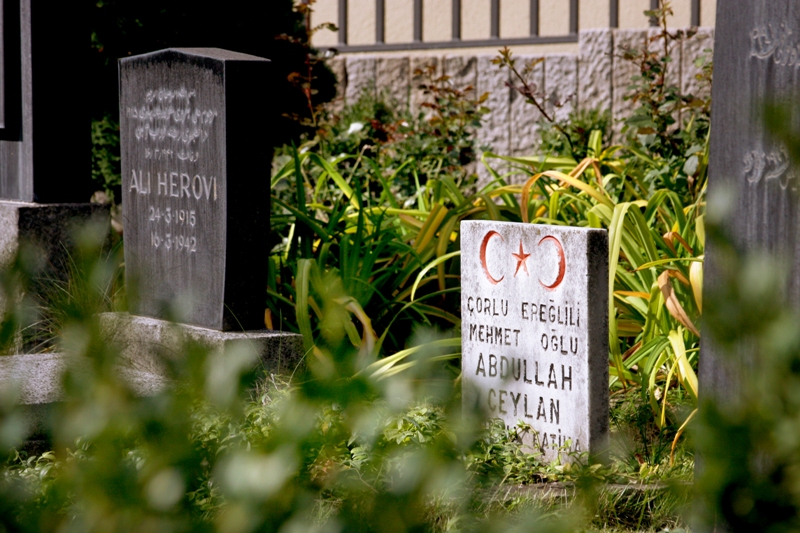For a long time, German Muslims have predominantly buried their dead abroad: especially the members of the country’s large Turkish community preferred to find their final resting place ‘back home’. Many of the so-called guest workers had envisaged a return to Turkey during their lifetimes but stayed on in Germany for work or for the sake of their families. The return home was delayed until after death.
Yet for some of the children of those who moved to Germany, the ties to their ancestors’ country of origin are increasingly remote. For others, the expense of a costly transfer of the body is simply too high; although this factor is often offset by the high cost of maintaining a grave in Germany. For yet others, warfare in their countries of origin makes a return for burial impossible.
All of this has led to a strong rise in demand for burials in conformity with Islamic rites in Germany. A seemingly innocuous issue, questions and perceptions surrounding these burials are indicative of the complex processes of adaptation Muslim communities undergo in the Western European context – as well as of the challenges this processes involves.
Running afoul of German law
To begin with, a number of Muslim traditions run counter to German legal regulations.1 In Germany, burial heeds to be carried out by an expressly hired professional undertaker; a notion unknown in other parts of the world. At the same time, there is not just a need for familiarity with the Islamic ritual on the part of the undertaker, but also for specific facilities to wash the dead body.
Muslim tradition encourages burial within 24 hours after death. Yet the slowly grinding mills of the German bureaucracy mean that burials cannot generally be accomplished in less than 48 hours. Medical regulations ate at times also adduced against quicker burial.
When it comes to the actual burial site itself, Muslims’ graves are customarily oriented towards Mecca – a requirement that cannot be fulfilled by most regular German cemeteries since the existing lines of graves are ordered differently.
What is more, in a somewhat macabre twist, an ‘eternal resting place’ in Germany generally means a maximum of 20 or 25 years – after that, graves are reallocated. Maintaining a grave beyond that point may be either impossible or dramatically increase the price of the grave lease. According to Muslim tradition, however, the dead should be buried in untouched earth and should have a genuinely eternal last home.
To name but one more hurdle, many administrations and cemeteries across the country require bodies to be buried in a coffin; a practice forbidden in Quranic tradition.
Pragmatic solutions
In many cases, practical solutions have been found.2 Specialised Islamic undertaking businesses have cropped up all over the country, offering their services to a Muslim clientele. Especially larger towns and cities have begun to create Muslim sections in their cemeteries in order to accommodate graves oriented towards Mecca.
Some municipalities have been more lenient on the rules restricting early burial, provided that no medical reasons demand that the burial be postponed. A specifically Muslim cemetery is set to open in the city of Wuppertal, offering graves with an unlimited lease.
Enduring challenges
In some cases, however, such solutions have proved elusive. Three German states – Bavaria, Saxony, and Saxony-Anhalt – continue to categorically prohibit burials without a coffin while others no longer require the casket.3
For some on the political right, upholding the so-called ‘coffin obligation’ (Sargpflicht) has become a matter of principled defence of autochthon values and traditions. (It should perhaps be noted that burials in a coffin were only introduced in Germany in the 18th century, making it a tradition presumably less essential to local identity than one might think.4)
Acts of vandalism
Nor have Muslims’ graves gone unnoticed in largely (post-)Christian neighbourhoods, with some expressing anxieties about the expansion of cemeteries’ Islamic sections. Only a month ago a series of Muslim graves was vandalised and desecrated by swastika signs in the southern town of Aalen.5
Yet apparently it is not only the far right that has been bent on destroying graves: in 2011, Islamic religious purists appear to have embarked on a purge in the Muslim section of a cemetery in Bielefeld, smashing angel figurines, terracotta sculptures and other ‘German-style’ adornments.
Since the graves themselves and a number of other Islamic symbols remained untouched, police surmised that the vandals only attacked those elements they deemed offensive to their restrictive understanding of Islam.6
The salience of identity politics
The question of death and burial is thus surprisingly revelatory about the nature of Muslim life in Germany. The scope for pragmatic accommodation balancing German legal frameworks and Muslim traditions seem large; yet a fair amount of intransigence from various players in the system also makes this room for manoeuvre more difficult to use. Identity politics in its more toxic forms – emanating from ethnically German xenophobes and Islamist fundamentalists alike – leaves its mark.
More generally, when following this issue in the centre-right section of the mainstream media, one is struck by the whole range of contradictory emotions and expectations that German Muslims are faced with: the implicit reproach of a lack of loyalty is directed at those who choose burial abroad. Yet at the same time, the expansion of Islamic segments on German cemeteries is greeted with a certain amount of suspicion and civilizational angst.7
In this manner, all sides manage to project their political ambitions onto Muslims’ final resting places. At times, the resulting debate seems almost as eternal as the peace people from across religious divides are seeking for their dead.
Sources
http://www.faz.net/aktuell/gesellschaft/menschen/bestattung-von-muslimen-teilweise-problematisch-14942392.html?printPagedArticle=true#pageIndex_2 ↩
https://www.welt.de/regionales/hamburg/article162782576/Wie-sich-deutsche-Friedhoefe-fuer-Muslime-veraendern.html ↩
http://www.faz.net/aktuell/gesellschaft/menschen/bestattung-von-muslimen-teilweise-problematisch-14942392.html?printPagedArticle=true#pageIndex_2 ↩
http://www.swr.de/swraktuell/bw/aalen-muslimische-graeber-auf-friedhof-geschaendet/-/id=1622/did=19107694/nid=1622/1tyli8u/index.html ↩
http://www.nw.de/lokal/bielefeld/mitte/mitte/4902487_30-muslimische-Graeber-geschaendet.html ↩
http://www.faz.net/aktuell/gesellschaft/menschen/bestattung-von-muslimen-teilweise-problematisch-14942392.html?printPagedArticle=true#pageIndex_2 ↩






